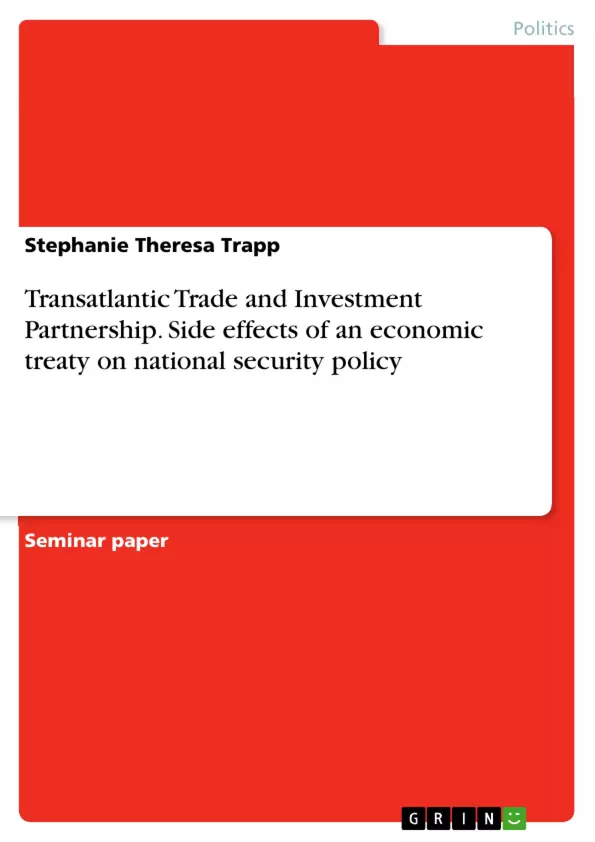The Transatlantic Trade and Investment Partnership (TTIP) which is intensely discussed in the media as well political and economic interest groups and political parties seems to have the potential to become “the largest bilateral trade and investment negotiation ever undertaken” between two major politico-economic blocks, namely the United States of America and the European Union. Its presumable effects will not only be visible on the economic level, but also profoundly affect judicial, political, social , and security issues. Due to the financial and Euro zone crises, the pact is about to be reshuffled, politico-economical powers have to be balanced anew and governments look for innovative and sustainable ways to reinvigorate their economies to position their industries and enterprises in the most competitive way on a global level. In this paper, the question of to what extent will potential effects of the Transatlantic Trade and Investment Partnership (TTIP) Program affect (1) U.S. and (2) European Security Policy attitudes will be answered and the ways to get to this answer will be explained.
This paper does not intend to promote or reject the TTIP initiative in a biased way, but to factually show potential positive and negative effects it would have and to what extent it would affect the United States and the European Union.
Inhaltsverzeichnis (Table of Contents)
- Introduction
- The partners
- a historical review
- History: EU as an economic and political entity.
- The USA as a global player.
- TTIP
- Development of an idea
- Negotiations
- Core elements of the contract..........\n
- Effects of TTIP on both sides
- Positive effects
- Negative effects.
- Further effects on other areas than economics.
- Foreign politics and diplomacy
- Security policies.
- Outlook......\n
- Conclusion
Zielsetzung und Themenschwerpunkte (Objectives and Key Themes)
This paper aims to assess the potential effects of the Transatlantic Trade and Investment Partnership (TTIP) on U.S. and European security policy attitudes. It analyzes the partnership's development, key elements, and anticipated economic and non-economic implications.
- The historical development and significance of the EU and the USA as major economic players.
- The TTIP initiative, including its development, negotiations, and core elements.
- The potential positive and negative effects of TTIP on the economies of both the EU and the USA.
- The potential implications of TTIP for foreign policy, diplomacy, and security policies in both regions.
- Strategies for maximizing positive effects and mitigating negative consequences of TTIP.
Zusammenfassung der Kapitel (Chapter Summaries)
The first chapter introduces the TTIP and its potential impact on various aspects, including economics, law, politics, society, and security. The chapter highlights the importance of understanding the TTIP's potential effects in the context of the financial and Eurozone crises. The second chapter focuses on the two main partners involved in the TTIP negotiations: the EU and the USA. It explores their individual economic development and global significance, emphasizing their long-standing economic relationship. The third chapter delves into the TTIP initiative itself, including its development, ongoing negotiations, and core elements. This chapter analyzes the “geo-economic alignment” between the two parties and aims to provide a factual overview of potential positive and negative effects without bias. The fourth chapter investigates the effects of TTIP on areas beyond economics, specifically focusing on foreign policy, diplomacy, and security politics. This chapter examines how the TTIP might influence the relationship between the EU and the USA in these areas. The fifth chapter offers an analytical outlook on the TTIP, highlighting steps to maximize positive effects and minimize negative ones. It also underscores the importance of public support and acceptance of the agreement.
Schlüsselwörter (Keywords)
The main keywords and focus topics of this paper include Transatlantic Trade and Investment Partnership (TTIP), economic treaty, security policy, geo-economic alignment, EU, USA, foreign policy, diplomacy, and public support. The paper also explores the potential impact of TTIP on various areas such as economics, law, politics, and society.
Frequently Asked Questions
What is the Transatlantic Trade and Investment Partnership (TTIP)?
TTIP is a proposed bilateral trade and investment treaty between the United States and the European Union, aimed at creating the largest free-trade zone in history.
How does TTIP affect national security policy?
The paper explores how economic alignment through TTIP could influence the security attitudes and foreign policy cooperation between the US and Europe.
What are the potential economic benefits of TTIP?
Potential benefits include reinvigorated economies, increased competitiveness for industries, and the elimination of trade barriers between the two major blocks.
What are the core elements of the TTIP contract?
The treaty focuses on market access, regulatory coherence, and global rules for trade and investment.
Why is public support crucial for TTIP?
Due to its profound effects on judicial, social, and political issues, public acceptance is necessary for the long-term sustainability of the pact.
- Arbeit zitieren
- Stephanie Theresa Trapp (Autor:in), 2014, Transatlantic Trade and Investment Partnership. Side effects of an economic treaty on national security policy, München, GRIN Verlag, https://www.grin.com/document/296209



